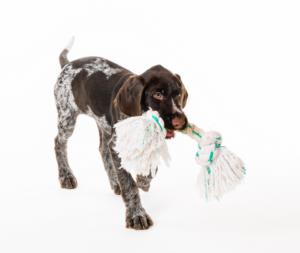Are German Wirehaired Pointers Kid Friendly?
According to professional German Wirehaired Pointer dog experts, German Wirehaired Pointer dogs score 
Not Good with Kids: In isolation, this dog breed might not be the best option for kids. However, to mitigate the risks, have the puppy grow up with kids and provide it with plenty of pleasant and relaxed experiences with them. This breed is also friendly toward other pets and shy toward strangers.









